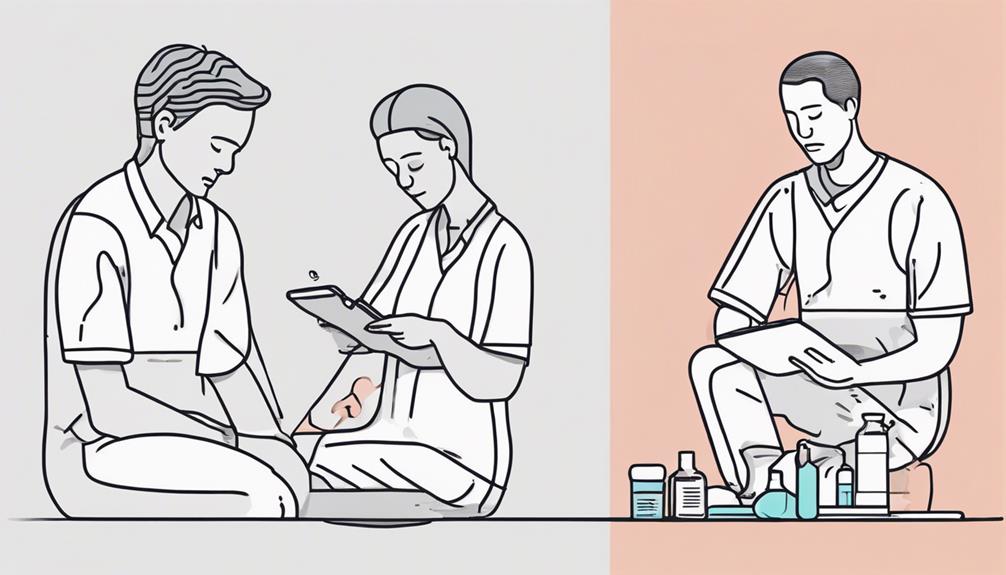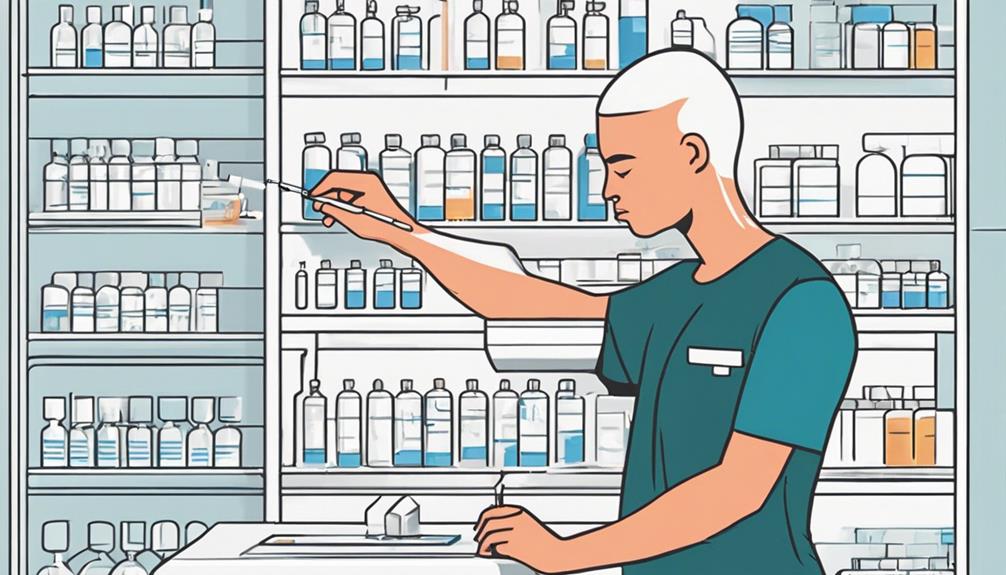When it comes to managing Type 1 Diabetes, staying ahead of the curve is key. From recognizing the early signs to understanding the intricacies of insulin administration, there are crucial steps you can take to navigate this condition effectively.
The journey begins with being aware of your body's signals and proactively monitoring your blood sugar levels. But that's just the start.
Are you ready to learn the essential initial intervention tips that could make all the difference in your diabetes management?
Key Takeaways
- Act promptly upon recognizing early symptoms to prevent complications.
- Monitor blood sugar levels consistently for effective management.
- Follow proper insulin administration techniques for optimal control.
- Prioritize timely medical assistance for severe situations to ensure proper care.
Recognizing Early Symptoms

When noticing the early symptoms of Type 1 Diabetes, it's crucial to act promptly to ensure proper management and care. Symptom identification is the first step towards early detection and effective treatment. Being aware of signs like excessive thirst, frequent urination, sudden weight loss, extreme fatigue, and blurred vision can help you catch Type 1 Diabetes in its early stages.
Early detection plays a significant role in preventing complications and promoting a healthier lifestyle. By recognizing these symptoms early on, you can seek medical attention promptly, leading to a quicker diagnosis and management plan. Remember, early intervention is key to maintaining good health and well-being.
Listen to your body and pay attention to any unusual changes. Ignoring symptoms can delay diagnosis and treatment, potentially causing more severe issues down the line. Empower yourself by being proactive about your health and seeking help when needed. Your well-being is worth prioritizing, so don't hesitate to address any concerns with your healthcare provider.
Checking Blood Sugar Levels
To effectively manage Type 1 Diabetes, regularly checking your blood sugar levels is essential for monitoring your condition and making informed decisions about your health. Here are three key tips to help you stay on top of your blood sugar levels:
- Continuous Glucose Monitoring: Consider using continuous glucose monitoring devices to track your blood sugar levels throughout the day. These devices provide real-time data, offering valuable insights into how your body responds to food, exercise, and medication.
- Meal Planning: Plan your meals thoughtfully to keep your blood sugar levels stable. Focus on incorporating a balance of carbohydrates, proteins, and healthy fats into your diet. Consistency in your eating habits can help regulate your blood sugar levels more effectively.
- Regular Testing: Make it a habit to test your blood sugar levels at consistent times each day. By monitoring regularly, you can identify patterns and trends, allowing you to adjust your treatment plan as needed. Remember, knowledge is power when it comes to managing Type 1 Diabetes effectively.
Administering Insulin Properly

Proper administration of insulin is crucial for effectively managing Type 1 Diabetes and maintaining optimal blood sugar levels. Ensuring you use the proper dosing and injection technique is key to the success of your treatment plan. When it comes to dosing, it's essential to follow your healthcare provider's recommendations meticulously. Factors like your current blood sugar levels, planned food intake, and activity level should all be considered when determining the correct dose.
The injection technique is another critical aspect to focus on. Make sure you rotate injection sites to prevent lipohypertrophy, a condition that can affect insulin absorption. Additionally, always use a new needle for each injection to maintain proper hygiene and prevent infections. Remember to inject the insulin into the fatty tissue just below the skin for optimal absorption.
Taking the time to learn and master the proper dosing and injection technique will empower you to take control of your diabetes management effectively. If you have any doubts or concerns, don't hesitate to reach out to your healthcare provider for guidance and support.
Understanding Carbohydrate Counting
To effectively manage your Type 1 Diabetes and support optimal blood sugar levels, understanding carbohydrate counting is essential. Here are three key points to help you navigate this important aspect of diabetes management:
- Meal Planning: When planning your meals, take into account the carbohydrate content of the foods you eat. Aim for a balanced intake of carbohydrates, proteins, and fats to help regulate your blood sugar levels effectively.
- Portion Control: Controlling your portion sizes can have a significant impact on your blood sugar levels. Be mindful of how much you're eating and try to stick to recommended serving sizes to avoid sudden spikes or drops in your blood sugar.
- Carb Counting: Learn to accurately count the carbohydrates in your meals and snacks. This skill will empower you to adjust your insulin doses effectively and maintain stable blood sugar levels throughout the day. Remember, knowledge is power when it comes to managing your diabetes.
Seeking Medical Assistance

When considering seeking medical assistance for managing your Type 1 Diabetes, it's crucial to prioritize timely communication with your healthcare provider. In emergency situations such as severe hypoglycemia or diabetic ketoacidosis, immediate medical intervention is essential. If you experience confusion, unconsciousness, extreme fatigue, or high blood sugar levels that don't respond to treatment, don't hesitate to seek help from medical professionals.
Medical professionals, including endocrinologists, certified diabetes educators, and emergency room staff, are trained to assist in managing acute diabetes-related issues. They can provide guidance on insulin dosage adjustments, offer education on carbohydrate counting, and help you navigate the complexities of Type 1 Diabetes.
Frequently Asked Questions
Can Type 1 Diabetes Be Prevented or Reversed Through Diet and Lifestyle Changes?
You can manage type 1 diabetes through lifestyle changes and dietary interventions. While prevention strategies aren't available, you can work closely with healthcare professionals to optimize your health, potentially improving outcomes and quality of life.
Are There Any Alternative Treatments or Therapies for Managing Type 1 Diabetes Besides Insulin Injections?
When managing Type 1 diabetes, exploring alternative therapies and holistic approaches can complement insulin. Consider dietary supplements and herbal remedies, but always consult healthcare professionals for safe integration with your current treatment plan.
What Are the Potential Long-Term Complications of Untreated or Poorly Managed Type 1 Diabetes?
Untreated or poorly managed type 1 diabetes can lead to serious long-term complications such as heart disease, kidney damage, nerve problems, and vision issues. It's crucial to prioritize proper management to prevent these potential effects.
How Does Type 1 Diabetes Affect Mental Health and Emotional Well-Being?
Living with type 1 diabetes is like navigating a maze blindfolded. It can impact your mental health, but with effective coping mechanisms like support groups and therapy, you can navigate these challenges with resilience.
Are There Any Support Groups or Resources Available for Individuals Living With Type 1 Diabetes and Their Families?
Support networks, online forums, and educational resources are available for you and your family. Community events, counseling services, peer mentors, advocacy organizations, and family support programs can offer guidance and understanding as you navigate life with type 1 diabetes.
Conclusion
As you navigate the world of type 1 diabetes, remember that you're the captain of your ship.
By recognizing early symptoms, checking blood sugar levels, administering insulin properly, understanding carbohydrate counting, and seeking medical assistance when needed, you're charting a course towards better health and well-being.
Just like a skilled sailor adjusts their sails to the wind, you can adapt your diabetes management strategies to steer towards a brighter, healthier future.
Keep sailing on, brave soul.